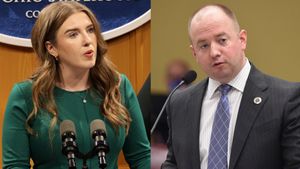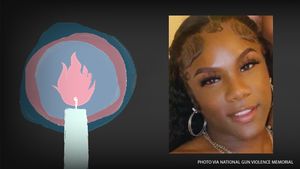I spent some time over the weekend congratulating my English friends as England and Wales legalized same-sex marriage effective at midnight March 29. (Scotland passed a similar law in February and marriages will begin there in October. Northern Ireland has not passed any laws allowing same-sex civil unions or marriages.) One couple I know were taking their civil union to the next step and marrying Saturday morning. One of the women has been battling breast cancer, so it was exciting to see the two of them sharing such joy after all the pain.
Reading commentary about the passage of the law in the British press, though, you would think everyone was always a supporter of same-sex marriage. But when I was living in London in the late 1980s, a wave of anti-gay sentiment washed over the entire UK with passage of Section 28, an amendment to the Local Government Act of 1986.
Section 28–I still have my No on 28 buttons–stated that no local authority could "intentionally promote homosexuality or publish material with the intention of promoting homosexuality" or "promote the teaching in any maintained school of the acceptability of homosexuality as a pretended family relationship."
Pretended family relationship. Sound familiar? We hear a lot of that same rhetoric here in the U.S. Except it’s not 1988 like it was when Section 28 was passed.
Civil unions were legalized in the U.K. in 2004–the year after Section 28 was finally repealed. And now, marriage is the law. In 25 years the U.K. has gone from "pretended family relationships" to Tory Prime Minister David Cameron saying the legalization of same-sex marriage sent a message that all people were equal, gay or straight.
When will that happen for us?
We’ve been waiting a long time here in the U.S. for what happened in England over the weekend. We’ve been waiting for the kind of equality that none of us has yet. Because even though 17 states and the District of Columbia now have same-sex marriage, the rest of us don’t. And until we all do, none of us will be equal under the law because the states that don’t have marriage equality impact the ones that do.
I should know. I live in Pennsylvania, the sixth most populous state. I live in Philadelphia, the fifth most populous city in the country. Every state around me–all of New England and the rest of the MidAtlantic states–have marriage equality. I could take a 20 minute drive across the Ben Franklin Bridge to New Jersey and get married. But then when I drove back again, my marriage wouldn’t count. It would be as if it never happened.
Unlike in Britain, where it counts in the whole of England, Wales, and Scotland.
If you’re gay or lesbian, live in Pennsylvania and want to get married and have that marriage give you the same rights as all the straight people you know, you’d better move.
Pennsylvania has one of the most repressive laws against same-sex marriage in the country. The state that brought the nation Rick Santorum doesn’t want gay men and lesbians getting married.
The question is, how and when will that change?
There’s a gubernatorial race going on in Pennsylvania. Four Democrats are running in the primary against the Republican incumbent, Gov. Tom Corbett. Every one of them supports marriage equality.
Could the tide be turning?
Same-sex marriage is definitely an issue, particularly in the state’s two largest cities, Philadelphia and Pittsburgh. Gov. Corbett is known for his strong anti-marriage stance, one he reaffirms regularly. And he wants to be re-elected desperately.
In Oct. 2013, Corbett quipped about gay marriage during an interview with the anchor of a Harrisburg TV station–because he treats it with that much disdain. Corbett was asked about a statement his lawyers had made in a recent court filing to stop Bruce Hanes, a Montgomery County Register of Wills from issuing marriage licenses to same-sex couples which he’d been doing since the Edie Windsor case was decided last June by the U.S. Supreme Court. Hanes had argued that ruling made Pennsylvania’s ban on same-sex marriage unconstitutional.
Corbett had set out to stop Hanes. In their briefs, Corbett’s attorneys had compared same-sex marriage to the marriage of children, because neither could marry in Pennsylvania.
Corbett told the anchor, "It was an inappropriate analogy, you know. I think a much better analogy would have been brother and sister, don’t you?" (She was clearly stunned by his joking manner.)
The Governor later apologized, but he was supported in his anti-marriage equality stance by the American Family Association of Pennsylvania. The conservative "family values" organization’s chapter president, Diane Gramley, urged Corbett not to back down, telling him, "The secular media, largely allies of homosexual activists, will continue to try to paint all those who support natural one man one woman marriage as hateful bigots," Gramley said. "If you say anything that opposes their quest for the legalization of their partnerships, you will be attacked. Since the early days of the Commonwealth, engaging in homosexual acts was recognized as detrimental and not what is best for society."
On the opposite side of the political spectrum stand the Democratic contenders. Rep. Allyson Schwartz has been a strong supporter of marriage equality in Congress, immediately supporting PA’s Attorney General, Kathleen Kane when she said after the Windsor ruling that she would no longer prosecute the state’s ban on same-sex marriage.
The other contenders are also strong on marriage equality. Tom Wolf, who leads in the polls and was in the last administration, issued his own statement on marriage equality and the need to overturn the ban post-Windsor. Kathleen McGinty, former head of the PA Department of Environmental Protection, who is supported by Bill and Hillary Clinton, has made a similar statement.
But last week, PA state treasurer Rob McCord, who polls third behind Wolf and Schwartz, clarified how important the gay and lesbian vote is in PA. He filed an amicus brief in support of a lesbian couple seeking to overturn the ban.
The case, filed by a lesbian couple who married in Massachusetts, argues that Pennsylvania’s refusal to recognize their marriage violates the U.S. constitution’s guarantee of equal protection under the law.
Personally, I have been waiting a long time for the marriage ban to be over. My partner and I, together for 15 years, have been rocked by the recession and the costs we have incurred due to the huge rise in health care premiums under Obamacare. Because we can’t marry, everything costs more.
A lot more.
We’ve considered that drive across the bridge to New Jersey many times. She teaches over there, we have many friends there more than willing to host a wedding for us.
We had discussed going to Montgomery County–only one county over from ours–and getting a license from the lovely Mr. Hanes last summer. But I know my state and I knew it would come crashing down on this social justice party Hanes was giving in MontCo. They don’t call us Pennsyltucky for nothing. We are backward. And Corbett’s comments repeatedly underscore how much.
Even though the polls are looking good for a Democrat right now, Pennsylvania has issues. One of the reasons we are the only state in the Northeast without either marriage equality or civil unions is because although we read blue for presidential elections–albeit not by much–we are a red state the remainder of the time. The blue tip of Philly, the fifth largest city in America, carries the state in national elections along with the more purple Pittsburgh. But the rest of the state is, as President Obama famously said when he was running for president in 2008, "clinging to their Bibles and their guns."
Pennsylvania is the most conservative of the Northeast states and that conservativism is both what created the law prohibiting same-sex marriage and what has maintained it even as similar laws have been struck down in every state around ours.
Yet more than many states, Pennsylvania needs and deserves marriage equality because our demographic cries out for it.
We are a poor state. Overall we rank 21st , but Philadelphia is the poorest of the top ten largest cities with one in three people on food stamps and/or living at the poverty level. Marriage is, quite simply, more cost effective than being single. If people in love want to marry, as my partner and I do, then why shouldn’t we be able to pool our meager resources and do so? Many lesbians and gay men in Philadelphia would benefit from marriage being legal in the state because so many of us bear extra financial burdens as unmarried couples, a burden we can ill afford.
It isn’t just that marriage would benefit poor and working-class lesbians and gay men like my partner and me, however. It would also benefit older Pennsylvanians, among them many lesbians and gay men, some of whom have been coupled for decades. Pennsylvania has the oldest population after Florida. Statistics show older people benefit greatly from marriage, living longer if they are happily partnered.
Marriage keeps people younger, keeps them more mentally alert and also benefits them financially. So in a state with a large elderly population like Pennsylvania, being able to marry and share love and caretaking as well as finances would greatly improve the quality of life for many older lesbians and gay men in Pennsylvania, literally giving them more years.
For people like my partner and I, who are middle-aged, the financial benefit would be immense. At present we both pay for health insurance–at a cost of nearly $2,500 per month. But if we were married, that amount would drop by two-thirds, as I would be covered by her health insurance, which is partially paid by her employer.
There are myriad other perks of marriage that would benefit us financially and make it possible for us to live a less stringent, hand-to-mouth existence, including a lower tax burden in a state with a high income tax.
And then there are the hospitals. I have been in sketchy health for some time, suffering from MS as well as a serious lung condition. In the past two years I have been in the hospital adozen or so times, each time in critical condition.
We’ve been fortunate in that our local hospital thus far has accepted our relationship and let her be with me when I am there. But that could change easily. And I always have to explain her relationship to me at the start of treatment so she can come into the cubicle with me in the emergency room or stay with me past visiting hours in my room and hope that the nurses on duty will be supportive.
Married couples don’t have to do this.
When my partner had a freak accident a couple of years ago, I alerted one of her family members who came to the hospital and immediately took over with her doctors as if I wasn’t there. I found myself almost yelling in the emergency room, explaining that I was her wife.
Even though I wasn’t.
I stood there–no legal standing–and her family member knew that. Thousands of lesbian and gay male couples are facing this every day in Pennsylvania.
And there’s more. My partner and I don’t have children, but we have many friends who do. One friend of mine has been in a battle to see her daughter for over a decade. When she and her ex split, the other woman–the birth mother–decided to shut my friend out of their child’s life. It’s been a heartbreaking series of legal battles, none of which could have happened had the two been legally married. Commitment ceremonies are very lovely, but they have no legal weight when a child is involved and a custody battle ensues.
So while my friends in the UK make their plans to marry and people I know throughout the reason do the same, my partner and I will continue to share anniversaries of our commitment, but not of our marriage. We will continue to pay more than our straight married friends for everything and look as if we are "single" on our tax returns and every other legal form we fill out, even though we have known each other since high school and 15 years is longer than most straight marriages last in America.
The four Democrats running for governor care about what happens to me and my partner, even if the current governor does not. But it’s been rare for an incumbent not to be re-elected in PA and we don’t know what will happen in the months ahead.
The lawsuits will continue to be filed, the battle that is being waged by LGBT rights organizations all across the state forges on. But for older lesbian and gay couples and for couples like my partner and myself, with so much to lose, the challenge to our archaic, mean-spirited ban on same-sex marriage can’t move swiftly enough.
Marriage still matters. And until every state has marriage equality, none of us has full equality. They get that in the UK, 25 years after Section 28. It’s past time we got it, too.
Victoria A. Brownworth is an award-winning journalist, editor and writer. She has won the NLGJA and the Society of Professional Journalists awards, the Lambda Literary Award and has been nominated for the Pulitzer Prize. She is a regular contributor to The Advocate and SheWired, a blogger for Huffington Post and a contributing editor for Curve magazine, Curve digital and Lambda Literary Review. She is the author and editor of nearly 30 books including Coming Out of Cancer: Writings from the Lesbian Cancer Epidemic and Restricted Access: Lesbians on Disability. Her collection, From Where We Sit: Black Writers Write Black Youth won the 2012 Moonbeam Award for Cultural/Historical Fiction. Her Y/A novel, Cutting will be published in fall 2014. @VABVOX






























































































































